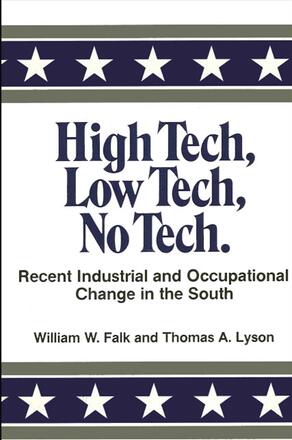
High Tech, Low Tech, No Tech
Recent Industrial and Occupational Change in the South
Alternative formats available from:
Description
Fifty years ago the quality of life in the 13 states of the Old South was judged to be among the lowest in the country. A lack of industrial development and the pervasiveness of a sharecropping system of agricultural production combined to keep the South mired in the backwaters of the American economy. Over the past five decades, however, the South has moved to the forefront as an area of economic growth. The authors show that significant improvements have taken place almost entirely in and around the major cities. Rural areas—especially those with a high percentage of blacks —remain saddled with an economic base dominated almost entirely by slow growing, stagnating, and declining industries.
The uneven development of the region is the result of a set of industrial policies in which communities attempt to lure prospective employers with lucrative business incentive packages. Guarantees of cheap, unorganized labor, tax holidays and giveaways of land and buildings are some of the 'chips' community leaders use in this high stakes game. Rural communities are often caught in bidding wars among themselves in which they are forced to offer even more lucrative incentives and in the process reallocate resources away from needed human services. Consequently, Falk and Lyson target the need for a national industrial policy that will bring some order to the industrial recruitment process.
William W. Falk is Chair of the Department of Sociology at the University of Maryland, College Park. Thomas A. Lyson is Associate Professor of Urban Sociology at Cornell University.
Reviews
"I am impressed with the broad multidisciplinary scope of this book—the effort to place the social and economic circumstances of particular groups or types of individuals into a broader analytic framework so that they can be understood not as isolated instances but as parts of an overarching system of social and economic organization." — Patrick M. Horan, University of Georgia
"The strength of the Falk-Lyson book is that it brings the industrial policy debate to bear on the rural South. The bottom line of the analysis is a question not often heard: 'What are the implications of industrial development policies for less-skilled workers and the poor?'. With that principal concern in mind, Falk and Lyson clearly demonstrate the disparities created by decades of 'de facto' southern industrial policies. As such, the book represents an important and timely critique of prevailing development strategies." — Charles M. Tolbert II, Florida State University